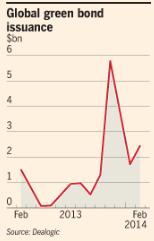Will governments firmly encourage corporates to ‘divest fossil assets’?
 Carbon dioxide intensifying climate change
Carbon dioxide intensifying climate change
The FT reports that Green bond issuance is estimated to have increased more than fivefold last year.
 Already this year 11 bonds have been issued, worth a total of $3.78bn. Zurich Insurance Group recently said it aims to become the largest global green bonds investor, with an initial target of $1bn.Green bonds fit Zurich’s overall investment strategy, targeted to support sustainable development and resilient communities. Cecilia Reyes, chief investment officer with the insurer, says: “It is an opportunity to invest with impact and at a return fully compensating for the risk.”
Already this year 11 bonds have been issued, worth a total of $3.78bn. Zurich Insurance Group recently said it aims to become the largest global green bonds investor, with an initial target of $1bn.Green bonds fit Zurich’s overall investment strategy, targeted to support sustainable development and resilient communities. Cecilia Reyes, chief investment officer with the insurer, says: “It is an opportunity to invest with impact and at a return fully compensating for the risk.”
This news will be appreciated by the Balsall Heath correspondent who sent a link to a Guardian article by Fiona Harvey about the findings of Green Finance, a report by the Environmental Audit Committee. Though this post has been delayed by technical problems the findings are well worth repeating:
- stock markets are overvaluing companies that produce fossil fuels and greenhouse gases, posing a threat to the economy, because the true costs of carbon dioxide in intensifying climate change are not taken into account in a company’s stock market valuation;
- the Bank of England’s financial policy experts should take advice from the Committee on Climate Change to monitor the risks to financial stability.
- current investments in “green finance” are less than a half of the amount needed to meet emissions reduction targets;
- the government should support binding national renewable energy targets for European Union member states.
 This approach contrasts favourably with the bland approach of Rajendra Pachauri, chairman of the UN’s Intergovernmental Panel on Climate Change, in a recent FT interview.
This approach contrasts favourably with the bland approach of Rajendra Pachauri, chairman of the UN’s Intergovernmental Panel on Climate Change, in a recent FT interview.
If we wait until nature forces us, the cost will be astronomical
Joan Walley, chair of the committee, said: “The record-breaking extreme weather events causing chaos across the globe should be a wake-up call. The transition to a low-carbon economy will be much more painful if we wait until there is a climate crisis before recognising that more than half of the world’s fossil fuel reserves will have to remain in the ground.”
Christiana Figueres, executive secretary of the UN Framework Convention on Climate Change (UNFCCC), said companies had a “fiduciary duty” to their shareholders to move to a low-carbon economy: “If corporations continue to invest in new fossil fuels, they are really in blatant breach of their fiduciary duty, as the science [of climate change] is abundantly clear . . . If we wait until nature forces us, the cost will be astronomical.”
Green Finance was presented at a conference in the City of London on Thursday, 6th March a few days after the Norwegian government launched an independent review of whether the country’s $840bn sovereign wealth fund should divest from fossil assets to protect itself to help the shift to a low carbon economy.
–
Another relevant article: http://www.theguardian.com/environment/2014/mar/06/could-fossil-fuels-melt-the-global-economy-carbon-bubble
–
Posted on March 18, 2014, in uncategorized and tagged Bank of England, Committee on Climate Change, Environmental Audit Committee, Green bond issuance, Rajendra Pachauri, UN Framework Convention on Climate Change, UN Intergovernmental Panel on Climate Change, Zurich Insurance Group. Bookmark the permalink. Leave a comment.
Leave a comment
Comments 0